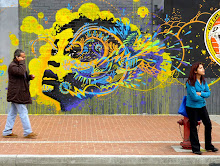One of the most profound expressions of our times is the symbolism of unlocking the third eye. French philosopher Rene Descartes was one of the original modern thinkers to study the third eye, and called it the seat of the soul. However, recognition of an "inner eye" permeated multiple ancient cultures and thought-schools. This forgotten knowledge is becoming increasingly important to consider, as renowned director David Lynch would tell you: his website, http://www.davidlynchfoundation.org/, says the following:
"In today’s world of fear and uncertainty, every child should have one class period a day to dive within himself and experience the field of silence—bliss—the enormous reservoir of energy and intelligence that is deep within all of us. This is the way to save the coming generation.
I have been “diving within” through the Transcendental Meditation technique for over 30 years. It has changed my life, my world. I am not alone. Millions of other people of all ages, religions, and walks of life practice the technique and enjoy incredible benefits."
Lynch believes that transcendental meditation is "the only way to save the next generation." He means this in a sense that elements of the media, politics and ultimately banking are putting challenges forth that will challenge our collective identities. More about this later.
Famous painter, and Tool album cover artist, Alex Grey, portrays the third eye extensively in his paintings. This is one of my favorites - New Man, New Woman (1984):
Keep in mind that this is a 24x30 inch oil painting! The vibrational energies are traveling through the external representation of the third eye at the edge of the forehead, and ending at its actual location: the pineal gland. Other layers of the human body represented are circulatory, nervous and skeletal among others. This connection established, with such energetic explosiveness, represents the awakening of the internal soul.
Life after death? Our dreams hold the key to this answer, and all three events, life, death and dreams, are all related by the pineal gland. At the moment of birth of life, the pineal gland secretes itself into existence, and vanishes at the time of death. The song "Uprising" by the groovy, trance-inducing band Muse, says the following:
Another promise, another scene, anotherPackage not to keep us trapped in greed with all the
Green belts wrapped around our minds and endless
Red tape to keep the truth confined, so come on
...If you could
Flick a switch and open your third eye, you'd see that
We should never be afraid to die, so come on.
Green belts wrapped around our minds and endless
Red tape to keep the truth confined, so come on
...If you could
Flick a switch and open your third eye, you'd see that
We should never be afraid to die, so come on.
Consequently, starvation of third eye perception can result in total disillusion. This is the theme of the dense Brad Anderson 2004 Movie The Machinist, in which Christian Bale loses 60 pounds to play an intensely skinny man who hasn't slept in over a year! Lack of sleep = lack of connectivity to consciousness = Disillusionment. Similarly, the sonically-charged, psychedelically-bludgeoning anthem "Burnout" by doom metal titans Electric Wizard paints an equally dreary picture of third eye starvation:
I wish I could dream
Dreams turned black I'll never see
Can't you see, nothing is real
Transparent world I cannot feel
I cannot feel
Imprisoned within my brain
Dried and burnt out
Chemical stained.
Dreams turned black I'll never see
Can't you see, nothing is real
Transparent world I cannot feel
I cannot feel
Imprisoned within my brain
Dried and burnt out
Chemical stained.
Considering this song is almost 19 minutes long, the lyrics are quite short and succinct. The chemical, sodium fluoride, which is a "pale yellow gaseous element in the Halogen group [of elements]," is an ingredient counter-productive to pineal gland health. In fact, the chemical calcifies it and affects the gland more than any other part of the body! Sodium Flouride can be found 2-4 parts per billion in most densely-populated areas' drinking water.
And to finish off, a collage by the talented Door County artist/ prophet Toler:
Indulge in the glory! -SubTemplum















No comments:
Post a Comment